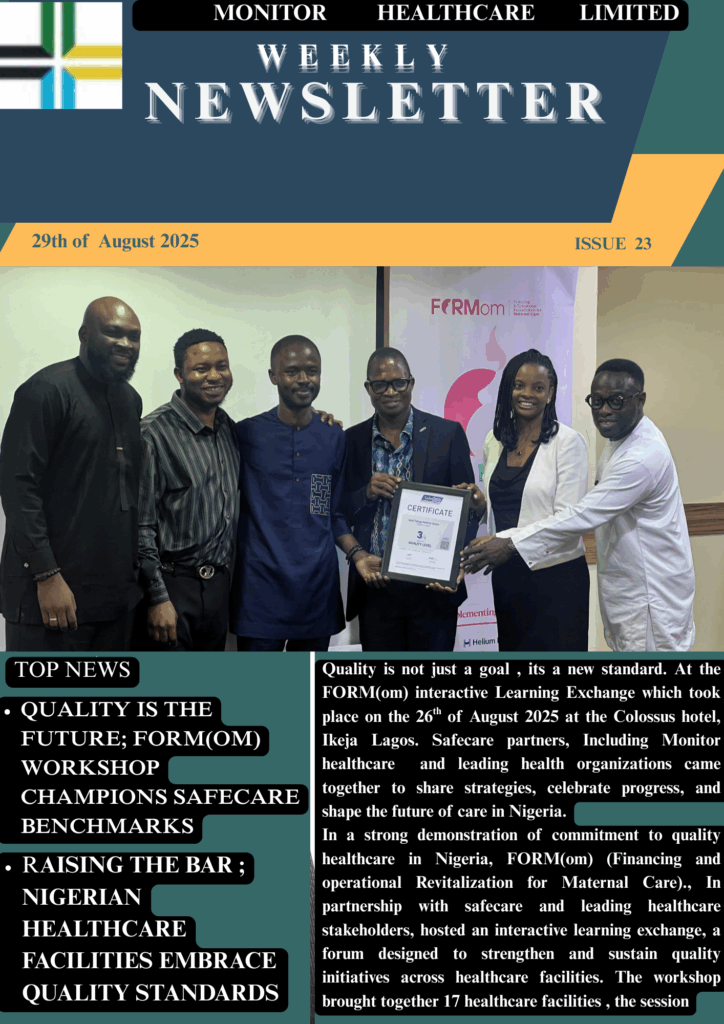From Safecare to Monitor Healthcare; Ensuring Continuity in Quality Improvement.
In a significant transition aimed at sustaining healthcare quality improvement in Nigeria, SafeCare, in collaboration with PharmAccess, officially concluded its program under the FOR M(om) initiative (Financing and Operational Revitalization for Maternal Care). As part of this transition, all healthcare facilities previously supported under FOR M(om) will now be handed over to Monitor Healthcare, a leading SafeCare partner committed to driving standards of excellence across healthcare services.
This strategic move underscores the commitment to continuity and sustainability of quality improvement programs in Nigeria. By transferring responsibilities from SafeCare to Monitor Healthcare, the goal is to ensure that facilities continue implementing SafeCare standards, adhering to their Quality Improvement Plans, and striving for higher quality levels.
The recent Interactive Learning Exchange Workshop served not only as a platform for sharing insights and celebrating progress but also as an opportunity to reaffirm the importance of quality improvement as a long-term business and healthcare strategy.
With Monitor Healthcare taking the lead, stakeholders remain optimistic that these facilities will maintain momentum, embrace innovation, and meet global benchmarks for patient safety and quality care
As part of the ongoing commitment to improve healthcare standards across Nigeria, FOR M(om)—Financing and Operational Revitalization for Maternal Care in partnership with SafeCare and key industry stakeholders, convened an Interactive Learning Exchange Workshop which took place on the 26th of August 2025, at the Colossus Hotel, Ikeja Lagos. This event served as a forum for collaboration, shared learning, and sustainable strategies to drive quality improvement across healthcare facilities.
The session brought together 17 healthcare companies and partners, including Monitor Healthcare, a recognized leader and front-runner in the quality improvement space. The goal was simple but impactful: to strengthen the culture of quality in healthcare and ensure better outcomes for patients, especially in maternal care.
Highlights from the Workshop
• Addressing Critical Delays in Care: Discussions focused on tackling the first and third delays in the continuum of care—from delays in deciding to seek care to delays in receiving care at facilities. Solutions explored included improved patient engagement, stronger communication strategies, and financing mechanisms for facility operations.
• Pushing for Digital Transformation: Stakeholders underscored the urgent need to digitize health record management, enabling better data-driven decisions and streamlined processes.
• Quality Standards for LMICs: Recognizing the challenges in low- and middle-income countries, the session mapped out practical steps to achieve SafeCare benchmarks, ensuring that even resource-limited facilities can meet international quality standards.
• Celebrating Progress: A major highlight was the presentation of certificates to healthcare facilities that successfully advanced through SafeCare’s quality levels. These achievements were made possible through adherence to SafeCare standards and the implementation of tailored Quality Improvement Plans (QIPs).
Why Quality Improvement Matters
Participants agreed that quality improvement is no longer optional—it is the new standard for healthcare delivery. Beyond clinical excellence, quality improvement impacts business sustainability, as future regulatory frameworks and patient trust will hinge on facilities meeting these benchmarks.
Investing in quality today positions healthcare providers for growth, compliance, and long-term success. As one participant noted, “The future of healthcare is quality-driven—and those who embrace it now will lead tomorrow.”
Together, SafeCare partners and healthcare leaders are building a system where every patient can access safe, reliable, and high-quality care. This is more than an initiative, it’s a movement to transform healthcare in Nigeria


![]()
